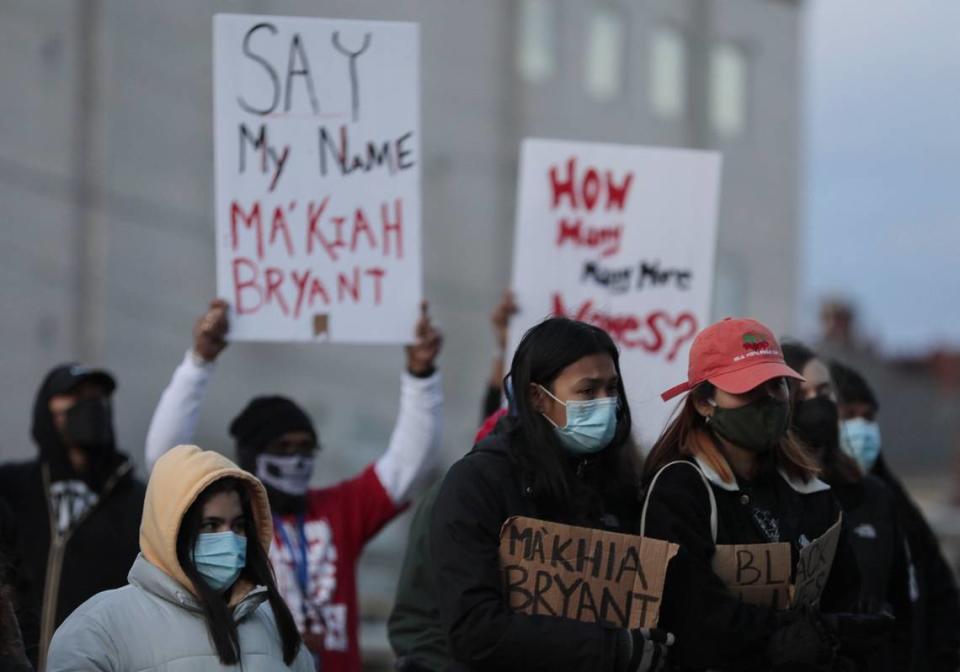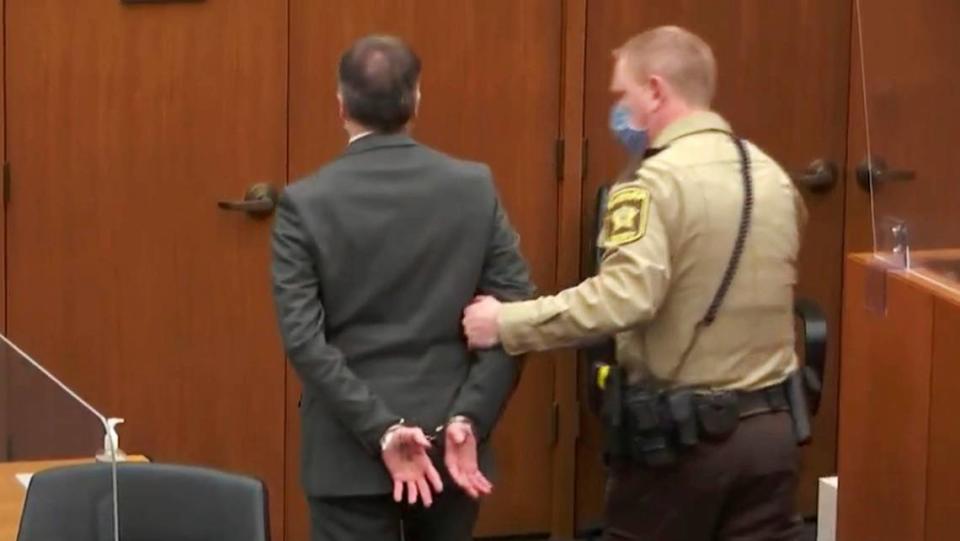On The Vine: Three steps forward. How many steps back?

It never fails. I can write all day long about any number of injustices and no one reaches out to thank me or to criticize me — not that I expect them to. But if I write about race, in any form, folks invariably crawl out of the woodwork to defend racism.
This week I wrote a column about what it is like being the mother of Black sons at a time when the list of names of Black people killed by police seems to grow every week. I talked about the fear that I and most mothers of Black sons feel every time their child is out of the house and how that doesn’t stop even when they are grown men.
I talked about the pain, the exhausting debilitating worry we endure, and the horrific history it holds.
And responses from readers flooded my inbox.
I received emails from so many mothers, of all races, thanking me for sharing. They empathized with the worry and the pain and they called the column brave. But wouldn’t you know, I also heard from folks repeating racist rhetoric and refusing to acknowledge that our worry that our Black sons could be shot and killed by police for a broken tail light, an expired tag, an air freshener dangling from a rear view mirror, is real. I find it funny that they seem to think they have some power to hurt my feelings with their ignorance. They don’t.
“You should be more afraid of your sons being killed by the Negro down the street,” one email said.
“You are not a victim and neither are your sons. Why don’t you write about black men slaughtering their own. If you don’t want to get shot by the police, how about you don’t resist arrest, run from police, point a gun at police,” another wrote.
These are real emails.
Listen, I really love hearing from readers and I welcome their emails. It’s how we connect with our community and develop a pool of potential sources for stories. So, I always respond to the good and the bad emails..
And the racist ones, yeah, I respond to those, too. Especially those. Because these folks write awful stuff and send it off as if they are writing to a machine, sending their bile into a void or something. They see the newspaper as some vacuous corporate entity. I want them to know there is a human being on the other side of that computer.
And here’s the fun part. I write back with a well thought out, well researched, respectfully putting you in your place, response. It’s kinda fun. And most of the time they just go away. Sometimes they even thank me.

Doing things a bit different this week...
Convicted murderer Derek Chauvin was found guilty on all three counts in the May 25, 2020, death of George Floyd. A jury on Tuesday convicted Chauvin of second-degree unintentional murder, third-degree murder, and second degree manslaughter.
The verdict was surprising. Witnesses gave heartbreaking and compelling testimony against Chauvin, and the world watched the 9 minute and 29 second video of Chauvin kneeling on Floyd’s neck as he called for his mother and yelled that he couldn’t breathe.
The verdict was surprising despite these facts because it was a result that so often alludes families and Black people in this country — a level of accountability rarely won. Even still there was a common solemn refrain: this is not justice. George Floyd is still dead. And immediately our attention is pulled to another Black teenager shot and killed by police.

A Columbus, Ohio, police officer, just before the Chauvin verdict came down, fatally shot 16-year-old Ma’Khia Bryant shortly after arriving to the scene of a physical altercation. Already we’re to believe a narrative that this was “different.” Police almost immediately released body cam footage of the scene to show Ma’Khia had a knife. The rhetoric that’s followed (“black on black crime”) has been inherently racist.
It’s one thing Ma’Khia is dead, but now, again, Black people are forced to endure a cycle of gaslighting. Forced to be told how to grieve, how to fight, and how to deal with trauma. Forced to see another video; learn another name.
We take three steps forward, but how many do we have to take back?
More from The Star on Derek Chauvin trial

The Star’s Cortlynn Stark writes on Kansas City community leaders’ immediate reactions to the verdict, including that of longtime activist and civil servant Alvin Brooks:
Alvin Brooks wanted to be home for the news.
But instead, he was stopped at a traffic light at East Red Bridge and Grandview roads when he heard the news over the radio.
A jury had found Derek Chauvin guilty of all charges.
“I started hollering and applauding in the car. Thank God. Thank God. Justice is served,” Brooks, one of Kansas City’s most beloved civic leaders, said. “What a moment! Oh what this means for the conscience of this nation.”
Don’t miss...
Kansas City activists on Chauvin verdict: ‘Finally, there’s some sense of justice’
Chauvin guilty verdict ‘sets a precedent.’ But can it change justice in America?
In the year since George Floyd’s death, Kansas takes little action on police reform
Beyond the block

The Videos That Rocked America. The Song That Knows Our Rage.
It’s not the first time, nor will it be the last that I say... this week I’ve seen more videos of police brutality, harassment and shootings of Black and brown people than I would have cared to in a lifetime.
I’ve spent increasingly more time on TikTok recently — it’s served as an escape the last year plus of the pandemic, but is even beginning to lose its luster — and a growing trend is videos of police harassing often young Black people. I watched one earlier this week of roughly six Perth Amboy, New Jersey, police SUVs confiscating bicycles from a group of teens —detaining one of them — for seemingly riding them in the street and without licenses.
There’s so many more where that came from.
I’m recently reminded of this June 2020 piece from New York Times culture critic Wesley Morris:
The most urgent filmmaking anybody’s doing in this country right now is by black people with camera phones. Their work comprises a ghastly visual mosaic of mistreatment, at best, and whose victims are international symbols of mourning: Eric Garner, Philando Castile, Sandra Bland. Art is not the intent. These videos are the stone truth. Quaking proof of insult, seasick funerals. Livestreamed or uploaded, or suppressed then suspiciously unearthed as found footage. Last week, the archive grew by two, and now the nation’s roiling...
This country manufactures only one product powerful enough to interrupt the greatest health and economic crisis it’s probably ever faced. We make racism, the American virus and the underlying condition of black woe. And the rage against it is strong enough to compel people to risk catching one disease in order to combat the other — in scores and scores of American cities, in cities around the world.
It’s, in part, because of one of these videos — from teenager Darnella Frazier — that Derek Chauvin was convicted of murder.
By bearing witness — and hitting ‘record’ — 17-year-old Darnella Frazier may have changed the world
Darnella Frazier, Teen Who Filmed Floyd’s Murder, Praised For Making Verdict Possible
Take Care
I’m not saying anything novel when I say that all of this takes an immense toll on Black people physically and mentally in particular. Not to mention there’s still work to do everyday and a pandemic to get through (It’s. Not. Over. People.) I don’t know how helpful really, but one place I’ve found solace is through an Instagram account @SoYouWantToTalkAbout
The account offers insight on a number of topics that are often top of mind, but tough to talk about or fully understand. Recently, they dug into understanding racial stress and trauma.
High-Profile Police Brutality Cases Harm Black Americans’ Mental Health: Study
Ask a Black therapist: 4 ways to support Black people’s mental health
From So You Want To Talk About:
Race-based stressors can include interpersonal, systemic, and vicarious experiences with racism, discrimination and violence against people of color.
Examples of race-based stress can include things such as:
Viewing the killing of unarmed Black and brown adults and children by police on television or on social media
Witnessing the persistent use of racial epithets or racial teasing on social media.
Experiences with race-based stressors can also be traumatic, meaning that they can lead to a psychological trauma with symptoms comparable to post-traumatic stress disorder (PTSD), which include negative alterations to cognition and mood, intrusive symptoms, avoidance, and physical reactions.
Let me know what you all do for self and psychologically restorative care.
Check in next week!
Did someone forward this newsletter to you? You can sign-up here. If you’d prefer to unsubscribe from this newsletter, you can do so at any time using the “Unsubscribe” link at the bottom of this message.

 Yahoo Finance
Yahoo Finance 